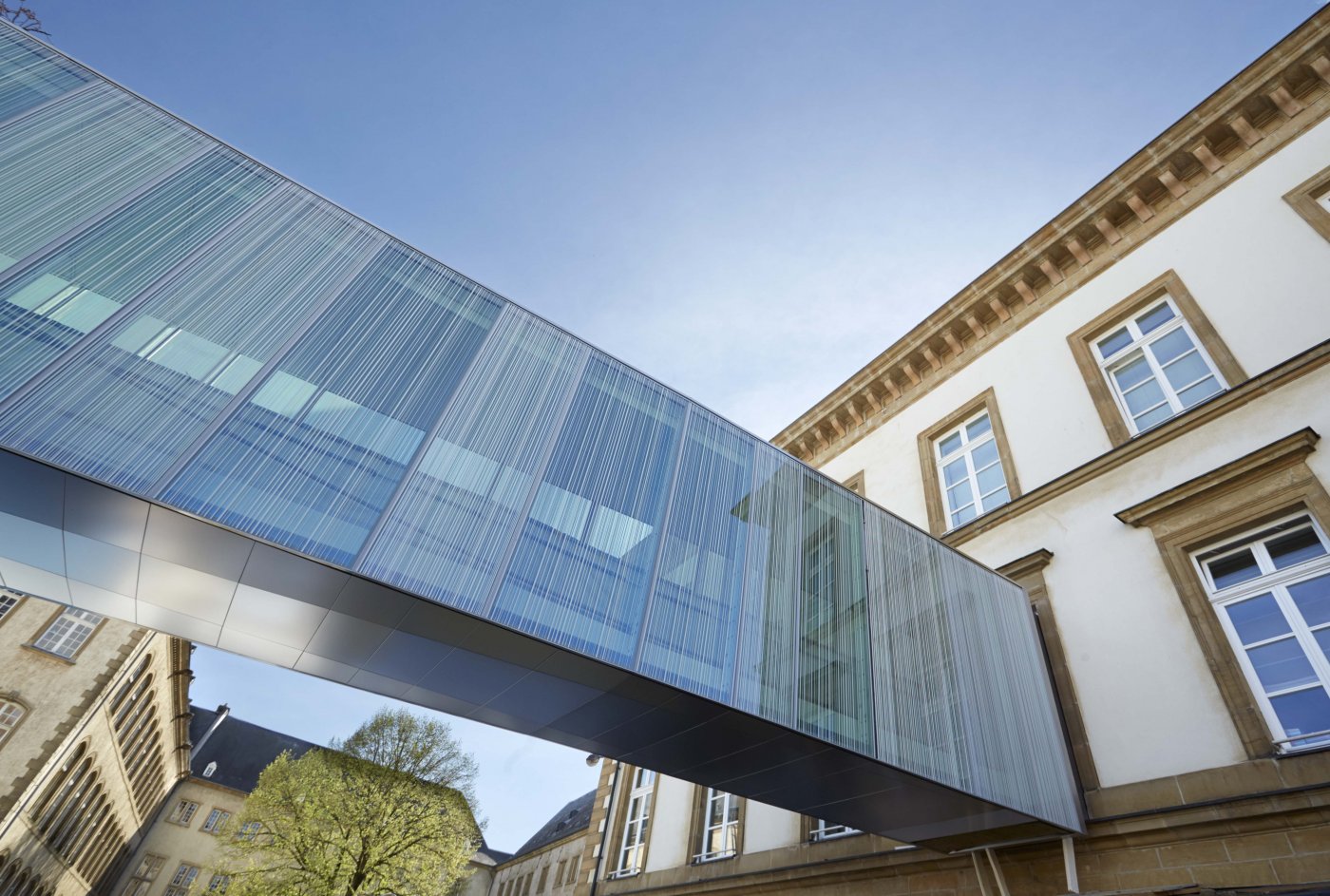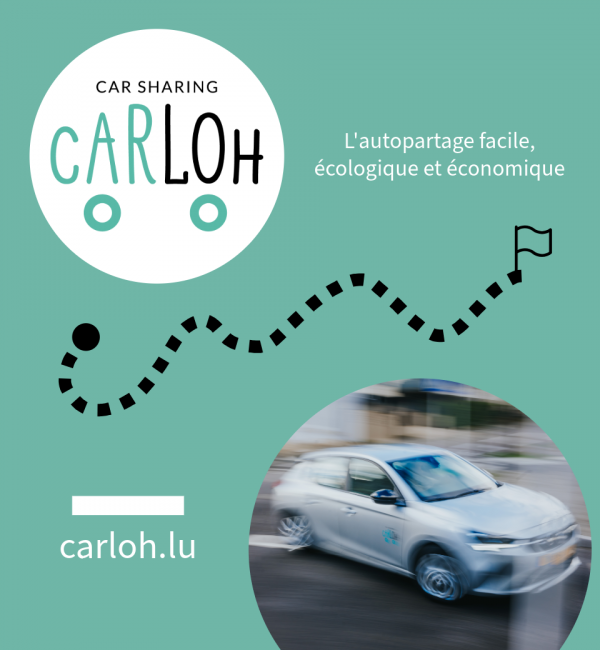Open session
1. Municipal councillors' questions.
2. Traffic: permanent amendments to the traffic regulations – confirmation of temporary regulations – decision.
3. Luxembourg City Conservatoire: organisation of classes for the 2023/2024 school year – final approval.
4. Agreements: acquisitions – miscellaneous – approval.
5. Urban development:
- Minor amendment to the Grossfeld Special Development Plan (PAP Grossfeld)
- Minor amendment to the Montée St Crépin Special Development Plan for Existing Districts (PAP QE montée St Crépin
- Subdivision of land pursuant to Article 29 of the law on municipal planning (loi concernant l'aménagement communal) – decision.
6. Allocation of special grants – decision.
7. Financial aid to non-governmental organisations (NGOs) for projects in developing countries – decision.
8. Allocation of a grant to the AIMF – decision.
9. Capital contribution for the financing of the extension of the crematorium – decision.
10. Municipal forest management plan for 2024 – Luxembourg-Bambësch and Luxembourg-Hamm forest management unit – opinion.
11. Management plan for the forest owned by the Municipal Hospices (Hospices civils) for 2024 (Lorentzweiler forest management unit) – opinion.
12. Repeal of the regulation of 7 May 2012 governing educator jobs (règlement d'occupation des postes d'éducateurs gradués du 7 mai 2012) – decision.
13. Repeal of the administrative fee charged by the Civil Registry (État civil) and the Bierger-Center as of 1 December 2023 – decision.
14. Motion tabled by the Déi Gréng political group to ease traffic in Luxembourg City – vote.
15. Motion tabled by the Déi Gréng political group to improve cyclist access to Luxembourg City centre – vote.
16. Motion tabled by the Piraten political group to build a pet cemetery – presentation.
17. Motion tabled by the Déi Gréng political group on the publication of advisory committee reports – presentation.
18. Motion tabled by the Déi Gréng political group to launch a zero-emission construction site pilot project – presentation.
19. Legal affairs: authorisation to initiate legal proceedings.
20. Creation/elimination of positions – decision.
Closed session
21. Advisory committees: replacement of members.
22. Municipal hospices: personnel matters – opinion.
23. Municipal hospices: replacement of one-fifth of the administrative committee.
24. Office social (Social welfare office): personnel matters – opinion.
25. Fondation J.-P. Pescatore: personnel matters – opinion.
26. Personnel matters – decision.
Live broadcast of meetings
Watch the video recording of this session.
Summary record
The summary record is a transcript of the Municipal Council's discussions and decisions. As such, it is an important source of information for citizens of the capital about projects and measures that may have an impact on their daily life.
Municipal councillors' questions
"Vortex Processes" technology used at the Kockelscheuer ice rink
Question posed by Nicolas Back
Nicolas Back (déi Gréng): In an article on the "Vortex Processes" technology, published in the magazine Paperjam on 18 August 2023, it was reported that this technology had been implemented at the Kockelscheuer ice rink but was not being used, and that the ice rink had neglected to take advantage of the opportunity to save €60,000 a year over the last 10 years.
The technology in question changes the structure of the water used for resurfacing, i.e. the process that entails restoring the upper layer of the ice rink. The technology reduces the temperature of the water sprayed onto the ice, thereby reducing energy consumption and the use of chemical products.
How long has this technology been implemented for? Can the College of Aldermen confirm that it is possible to save €60,000 a year with this technology? Why hasn't the technology been used? How much water, energy and chemical products would be saved with this technology (in absolute figures and in percentage terms)? How much would CO2 emissions be reduced by?
Response provided by Alderwoman Simone Beissel
The "Vortex Processes" technology was installed some 15 years ago by a Finnish company but was a disaster from the outset. The company in question had promised that cold water could be used to maintain the rink and smooth the surface. By using cold water, the system is supposed to save energy and water. But it never worked.
Cofely – the company that operates the rink – has on its staff a person whose expertise is recognised throughout Europe, and that person was involved in the building of the Kockelscheuer ice rink. Working closely with that expert, the relevant municipal departments tried everything to resolve the problem, but the ice would become brittle and it proved impossible to achieve satisfactory results.
That explains why the traditional approach was reinstated and has been in use for several years. This approach entails using water heated to a temperature of 40°C and, of course, every effort is made to save as much water as possible. The rink operator has gone to great lengths to achieve energy efficiency and protect the environment, and the rink is regularly upgraded to incorporate the latest technological developments. It goes without saying that the City as well is no longer interested in the new process that the Finnish company is currently proposing. The process that is currently in use will be maintained.
For better use of wastewater
Question posed by Nicolas Back
The efficient use of water, especially drinking water, is becoming an increasingly important issue in Luxembourg. The population is growing, and with the effects of climate change, drought periods are becoming more intense. In addition to the measures undertaken to protect water sources and reduce energy consumption, these effects have prompted the government to consider using drinking water sourced from the Moselle. As such, it is vital that all consumers of water – be they residential, industrial or public-sector consumers – reduce their consumption of drinking water. And this does not only apply to Luxembourg.
In France, several municipalities have launched pilot projects involving the reuse of treated wastewater from water treatment plants to clean streets, wash out sewage lines, and water parks.
Is the City of Luxembourg already using non-potable water, for instance to flush toilets in buildings owned by the City, or to water plants? What measures has the City taken in recent years to save drinking water? Has it already considered and conducted studies on the use of treated wastewater from the Beggen water treatment plant? If so, what conclusions can be drawn from these considerations? Can the treated water from the Beggen water treatment plant already be used for certain applications, such as cleaning streets, or watering parks, market gardens and sports fields? If it cannot be used today, will it be used once the works currently underway to increase the capacity of the Beggen water treatment plant are completed? If so, within what time frame? What additional processes and investments would be required to use treated wastewater?
Response provided by Alderwoman Simone Beissel
The City of Luxembourg is well aware of the value of the "blue gold" that drinking water represents, and strives at all levels to use the most advanced techniques. The City already uses greywater to water plants in parks and in the greenhouses maintained by the Service Parcs (Parks Department). Setting up a greywater network would require undertaking considerable works throughout the capital, as greywater pipelines would have to be laid in every street, new connections would have to be made for all buildings, and new piping would have to be installed inside the buildings. Studies are currently being conducted on other uses of greywater, both nationally and internationally.
The drinking water network has been completely renovated in recent years. With the new network management system, leaks are detected very quickly. And the new smart metres enable us to respond quickly to any malfunctions. A lot has already been done to raise awareness, including in schools. An "Économisez l'eau!" (Save Water!) leaflet was published in March 2023 and can also be viewed on the City's website. All new buildings erected by the City are fitted with equipment (taps, etc.) designed to save drinking water.
At the Beggen water treatment plant, a huge quantity of treated water is already being used for on-site cleaning and to dilute chemical products. The treated water that is discharged into the Alzette cannot be used for the time being. Even if we managed to further improve the quality of the water, the distribution network – for instance, to supply a hypothetical large-scale industrial operation located near the water treatment plant – would be lacking.
To accommodate the rapid growth in the population, the capacity of the Beggen water treatment plant will be increased to 450,000 population equivalents by 2029. A European directive requires us to introduce a fourth purification stage to eliminate drug residues, paint residues and pesticides. Once this phase has been completed, an additional purification stage, for the possible use of wastewater for market gardens, for instance, could be envisaged.
The City intends to remain at the cutting edge of progress, and is open to any useful technologies that can improve water and environmental protection.
Collection of used syringes in the Gare district
Urgent question posed by Gabriel Boisante
As we all know, there is a drug-use problem in the Gare district. In the past few weeks, a number of citizen-driven initiatives have appeared on social media. A member of staff of the Luxembourg General Hospital (Centre hospitalier de Luxembourg – CHL) was quoted as saying that every day, at least one member of the City of Luxembourg's staff comes to the hospital because they were pricked by a needle while picking up syringes in the Gare district.
Does the City have any data on workplace accidents that endanger the health of municipal staff in the course of their work in the Gare district? How does the City ensure the safety of these people, who perform a difficult task in an exemplary manner? What special measures – personal protective equipment, training, etc. – have been implemented to prevent staff from contracting diseases while collecting waste or cleaning public spaces?
The statement mentioned above was shared by a person who is actively involved in local politics – they are not on the Municipal Council. Even if the statement in question is untrue, I would like to stress that we need to think carefully about what we share on social media, and about how we treat sources of information.
Response by Alderman Patrick Goldschmidt
Sometimes, it is better to read newspapers and get our news from serious media instead of from social media. In July 2023, a Luxembourg daily asked us the exact same question as the one you have just asked us. I will summarise the answers we gave: All workplace accidents are reported immediately to the relevant department and to the Direction Ressources humaines (Human Resources Directorate). In the past five years, no accidents have occurred, i.e. no one from the Service Hygiène (Sanitation Department) has been to the CHL for an injury sustained while handling a syringe. Due to the high risk involved, the members of staff tasked with collecting syringes are provided with appropriate work equipment, including special gloves, safety shoes, litter pickers, and special containers. In principle, this task is always performed by the same people. Staff safety is our top priority. If, despite everything, an accident were to occur, we would, of course, conduct and in-depth analysis to determine what could be improved.
Cleanliness of the Fort Wedell car park and the passageway linking the Rocade de Bonnevoie to Luxembourg Central Station
Question posed by Antónia Afonso Bagine
In public spaces, such as the Fort Wedell car park, the passageway linking the Rocade de Bonnevoie to Luxembourg Central Station, and the elevators on the Rocade side, littering is a regular occurrence. Water seepage is also a problem in the Fort Wedell car park. Is the College of Aldermen aware of this? Have there been any changes in how these places are cleaned, especially since their state of cleanliness now leaves much to be desired? What does the College of Aldermen intend to do about this state of affairs?
Response by Alderman Patrick Goldschmidt
A maintenance agreement between the CFL and the City of Luxembourg stipulates that the City is responsible for cleaning the two elevators in Bonnevoie and the passageway linking the Rocade de Bonnevoie to Luxembourg Central Station. The City has hired an external provider to carry out the work. The CFL is responsible for cleaning the elevators providing access to the train platforms, as well as the elevator at Luxembourg Central Station. A tour of the sites in question revealed that in some places, the cleanliness failed to meet the City's requirements. The City has therefore asked the external provider to ensure that the passageway and elevators are kept spotless.
Where the Fort Wedell car park is concerned, the City had already met with the operator a few months ago to discuss the poor state of cleanliness. On a subsequent tour of the premises, the Service Parking (Parking Department) observed that they were still not as clean as they could be. The City asked the operator to remedy the situation immediately and to ensure that the car park is kept clean at all times in the future. As for the problem of water seepage, the operator has repainted the affected walls. The City's Service Ouvrages d’art (Civil Engineering Department) has been tasked with coming up with a lasting solution to the problem.
Allocation of places to fairground traders for events such as the Christmas market in the city centre
Urgent question posed by François Benoy
According to a report broadcast on television yesterday, local fairground traders have been complaining about not being selected for this year's Christmas market. They made the point that the City should support local fairground traders. According to the same report, the College of Aldermen uses an assessment system based on specific criteria to allocate places at the Christmas market. It seems that the number of applications far exceeds the number of available places.
What criteria does the College of Aldermen use to screen applications for places at the Christmas market, and for other major events for that matter, such as the Schueberfouer? Are fairground traders whose application is rejected given a reason for this decision? Doesn't the College of Aldermen believe that the process of selecting fairground traders for major events, such as the Christmas market, should be more transparent?
Response by Alderman Patrick Goldschmidt
First of all, I would like to point out that the statements made by the fairground trader in question – who spoke of poor management when it came to allocating places, and the allegedly strained atmosphere between some of the persons involved – are not in keeping with the view of the National Federation of Fairground Traders (Fédération Nationale des Commerçants Forains), whose chair I have the pleasure of meeting today in the Municipal Council meeting room, along with other committee members.
For the last several years, the City has been publishing a call for applications, further to which places are allocated based on a points system, which itself is based on specific and transparent criteria. The criteria are weighted as follows:
- appeal of the products on offer, originality, and theme (30%);
- aesthetics of the proposed stall, especially as it pertains to the theme of winter or Christmas (30%);
- compatibility of the stall and the products on offer with the theme of the event (20%);
- applicant's participation in the event in the previous season (20%).
The criteria are published on the City's website for the sake of total transparency. Additionally, the legitimacy of the process and of the criteria used was confirmed in a recent ruling handed down by the Administrative Tribunal.
After applying the selection criteria, the relevant municipal department submits a proposal to the College of Aldermen, which has the final say as to which applicants are selected.
I would like to emphasise that the fairground trader in question has not been barred from taking part in events organised by the City of Luxembourg. For instance, they have been selected to take part in the Schueberfouer.
Due to the COVID-19 pandemic, the layout of the stalls at the Christmas market in Place d'Armes was changed in 2021, in consultation with the National Federation of Fairground Traders. Traders whose stalls were in the second row now enjoy a better location. The trader who expressed their view in the report in question did not want to take part in the Christmas market in 2021 because they were not satisfied with these changes. As such, they got fewer points when applications were being assessed for the following year.
Earlier today, the City received a letter from the National Federation of Fairground Traders refuting the statements made by the trader in question. Of course, the federation and the City remain at the disposal of fairground traders to resolve any issues that may arise.
Article 13, paragraph 3 of the Municipal Law establishes that each member of the Municipal Council, acting in their individual capacity, shall enjoy the right of initiative to add to the agenda drawn up by the College of Aldermen one or more proposals that they wish to submit to the Municipal Council.
Such proposals must be submitted to the Mayor in the form of a written reasoned request at least three days before the meeting of the Municipal Council.

















